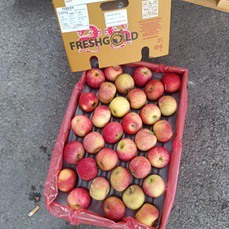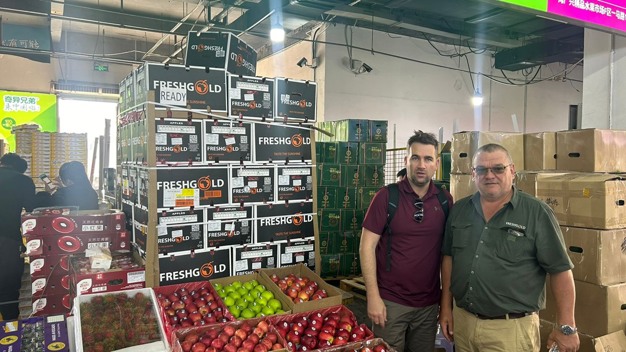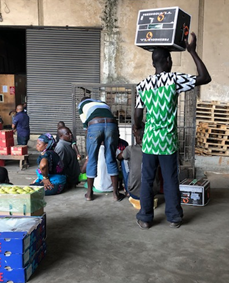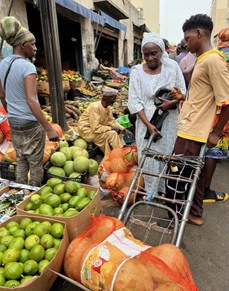 "It's been a difficult year trading in Africa, where we never kicked off with prices as we'd hoped," says Renier Grobbelaar, director of procurement at Freshgold. "And Europe has been a disappointment regarding early BCs, Packhams and Pink Ladies. The East has been there for us, but South Africa is having issues with quality on arrival."
"It's been a difficult year trading in Africa, where we never kicked off with prices as we'd hoped," says Renier Grobbelaar, director of procurement at Freshgold. "And Europe has been a disappointment regarding early BCs, Packhams and Pink Ladies. The East has been there for us, but South Africa is having issues with quality on arrival."
Right: Freshgold's new golden carton for the Chinese market with Fuji apples from Villiersdorp
They've never had this high of an incidence of lenticel breakdown and bitter pit spread across all the apple-producing regions in the Western Cape and the Langkloof (which runs over into the Eastern Cape), he says, and they postulate it is as a result of floods during the past growing season which might have leached large amounts of fertiliser from the root zone.
"A month ago, I visited the East and I saw that the market's impression is of South Africa having a difficult quality year. It's not good for the South African brand," Grobbelaar says, but he notes that with the apples waiting in CA rooms such quality issues become apparent before they are packed, therefore hopefully guaranteeing that arrivals will henceforth be lower risk.
He remarks that at the start they had expected a good year on South African pears in an empty European market, but it's been the opposite: in anticipation, too many and too small pears were sent during the early part of the season and now sales are sluggish.

Cornelius de Villiers and Renier Grobbelaar of Freshgold with their fruit in Malaysia.
"Now and then you can hit the jackpot in Europe when the market there is empty, but you'll never do as well as when the market in the East is empty. Europe has enough alternatives for sourcing pears, which is why we've got to keep our focus on the East. That's where the opportunities are."
African fruit import costs still increasing despite free trade agreement Africa accounts for 35% of Freshgold's apple trade; every large South African apple exporter needs that division to their business, as Golden Delicious apples make up such a big portion of the South African crop.
Africa accounts for 35% of Freshgold's apple trade; every large South African apple exporter needs that division to their business, as Golden Delicious apples make up such a big portion of the South African crop.
Right: Freshgold's apples in Nigeria.
However, South Africa's apple exports to the rest of the continent are lower compared on a year-to-date basis: 3.8 million 12.5kg cartons have gone this season, compared to 4.4 million cartons by this time last year. Russia is a good alternative for Goldens, which accounts for some of, but not all of the reduction in trade with Africa.
"The difference primarily comes in with apples that in the past would go to buyers in Africa, varieties like Goldens and Top Red that now find other homes because of the risk of slow payment or not being paid at all."
Alan Vorster heads up Freshgold's African desk and he witnesses the struggle that their buyers face. "Import costs are really very high and in countries like Ghana and Nigeria some importers are finding it difficult to cope with the weakening of their currencies. They already complained about prices 18 months ago – and then their currency weakens by a further 50%! You have to wonder how people can afford it at all." Within the continent, import tariffs on South African fruit are very high: 25% to 30%, while the African Continental Free Trade agreement is still only a paper construct. Vorster did a quick poll among some of their big buyers in Nigeria, Ghana, Cameroon and Senegal and none of them have seen any relief on the high import duties.
Within the continent, import tariffs on South African fruit are very high: 25% to 30%, while the African Continental Free Trade agreement is still only a paper construct. Vorster did a quick poll among some of their big buyers in Nigeria, Ghana, Cameroon and Senegal and none of them have seen any relief on the high import duties.
Right: a fresh market in Senegal.
On the contrary, some indicated that the import costs per 40ft reefer have even increased, some as high as 8,500 euros per container.
"Imagine, if duties were removed, how many more people in Africa would have access to an apple or a pear," says Grobbelaar. The steady reduction of import duties won't necessarily mean an immediate higher return to the grower in South Africa, he observes, nor an obviously less expensive imported apple and pear to the consumer.
"We'd definitely sell more apples to Africa, which will improve our returns, and imports would land at more affordable prices on the other side, lifting sales. Somewhere in the middle, we will find the sweet spot where supply and demand meet."
For more information:
Freshgold
Tel: +27 21 555 1966
Email: [email protected]
https://freshgoldsa.co.za/
